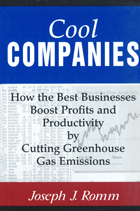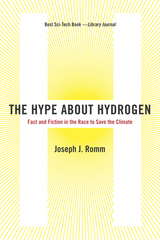
Despite ongoing negotiations, consensus has not yet been reached on what action will be taken to combat global warming. A number of companies have looked beyond the current stalemate to see the prospect of reducing greenhouse-gas emissions not as a roadblock to growth and innovation but as a unique opportunity to increase profits and productivity. These "cool" companies understand the strategic importance of reducing heat-trapping emissions and have worked to cut their emissions by fifty percent or more. In the process, they have not only reduced their energy bill, but have increased their productivity, sometimes dramatically.
In Cool Companies, energy expert Joseph Romm describes the experiences of these remarkable firms, as he presents more than fifty case studies in which bottom line improvements have been achieved by improving processes, increasing energy efficiency, and adopting new technologies. Romm places efforts to reduce emissions in the context of proven corporate strategies, showing managers how they can build or retrofit their operations with the latest technologies to reduce emissions and achieve quick returns on the investment. Case studies explain:
- the concept of "lean production" and why systematic efforts to reduce emissions so often lead to productivity gains
- how changes in office and building design can significantly increase productivity, greatly compounding gains achieved from increased energy efficiency
- options for "cool" power -- from cogeneration to solar, wind, and geothermal energy
- energy efficiency in manufacturing, including motors and motor systems, steam, and process energy
In profiling successful companies such as DuPont, 3M, Compaq, Xerox, Toyota, Verifone, Perkin-Elmer, and Centerplex, among many others, Cool Companies turns on its head the notion that the effort to combat global warming will come with massive costs to the industrial sector. It is a unique and essential business book for anyone concerned with increasing profits and productivity while reducing greenhouse gas emissions.

Not so fast, says Joseph Romm. In The Hype about Hydrogen, he explains why hydrogen isn't the quick technological fix it's cracked up to be, and why cheering for fuel cells to sweep the market is not a viable strategy for combating climate change. Buildings and factories powered by fuel cells may indeed become common after 2010, Joseph Romm argues, but when it comes to transportation, the biggest source of greenhouse-gas emissions, hydrogen is unlikely to have a significant impact before 2050.
The Hype about Hydrogen offers a hype-free explanation of hydrogen and fuel cell technologies, takes a hard look at the practical difficulties of transitioning to a hydrogen economy, and reveals why, given increasingly strong evidence of the gravity of climate change, neither government policy nor business investment should be based on the belief that hydrogen cars will have meaningful commercial success in the near or medium term. Romm, who helped run the federal government's program on hydrogen and fuel cells during the Clinton administration, provides a provocative primer on the politics, business, and technology of hydrogen and climate protection.

In 2003, energy expert Joesph J. Romm wrote The Hype About Hydrogen to explain why hydrogen wasn’t the panacea we were promised—and may never be. In this newly revised and updated edition, Romm builds an even stronger case, explaining the barriers hydrogen faces, from its inefficiency as an energy carrier to the “chicken-and-egg” problem in infrastructure development and the risk of increased global warming from hydrogen leaks and emissions. In a series of significant updates, Romm breaks down the latest methods of production, including "green" hydrogen, hydrogen made with nuclear power, geologic hydrogen, and “blue” hydrogen from natural gas with carbon capture and storage (CCS), laying out the challenges with each. He then explores the limitations of suggested applications of hydrogen, including e-fuels made with direct air capture of CO2, hydrogen cars, and heating in buildings and industry.
The Hype About Hydrogen is essential reading for anyone who hopes that hydrogen will be a major solution to the climate crisis. The good news? We don’t need it to be. With advancements in renewables and battery technology, electrification offers us a path forward that is cleaner, safer—and can be implemented today.

Straight Up draws on Romm’s most important posts to explain the dangers of and solutions to climate change that you won’t find in newspapers, in journals, or on T.V. Compared to coverage of Jay-Z or the latest philandering politician, climate change makes up a pathetically small share of news reports. And when journalists do try to tackle this complex issue, they often lack the background to tell the full story. Despite the dearth of reporting, polls show that two in five Americans think the press is actually exaggerating the threat of climate change. That gives Big Oil, and others with a vested interest in the status quo, a huge opportunity to mislead the public.
Romm cuts through the misinformation and presents the truth about humanity’s most dire threat. His analysis is based on sophisticated knowledge of renewable technologies, climate impacts, and government policy, written in a style everyone can understand. Romm shows how a 20 percent reduction in global emissions over the next quarter century could improve the economy; how we can replace most coal and with what technologies; why Sarah Palin wears a polar bear pin; and why controversial, emerging technologies like biochar have to be part of the solution.
The ultimate solution, Romm argues, is bigger than any individual technology: it’s citizen action. Without public pressure, Washington and industry don’t budge. With it, our grandkids might just have a habitable place to live.
“The Web’s most influential climate-change blogger” and “Hero of the Environment 2009”
—Time Magazine
“I trust Joe Romm on climate.”
—Paul Krugman, New York Times
“America’s fiercest climate-change activist-blogger” and one of “The 100 People Who Are Changing America”
— Rolling Stone
“One of the most influential energy and environmental policy makers in the Obama era”
— U.S. News & World Report
“The indispensable blog”
—Thomas Friedman, New York Times
“One of the most influential energy and environmental policy makers in the Obama era”
— U.S. News & World Report
“The indispensable blog”
—Thomas Friedman, New York Times
READERS
Browse our collection.
PUBLISHERS
See BiblioVault's publisher services.
STUDENT SERVICES
Files for college accessibility offices.
UChicago Accessibility Resources
home | accessibility | search | about | contact us
BiblioVault ® 2001 - 2025
The University of Chicago Press









